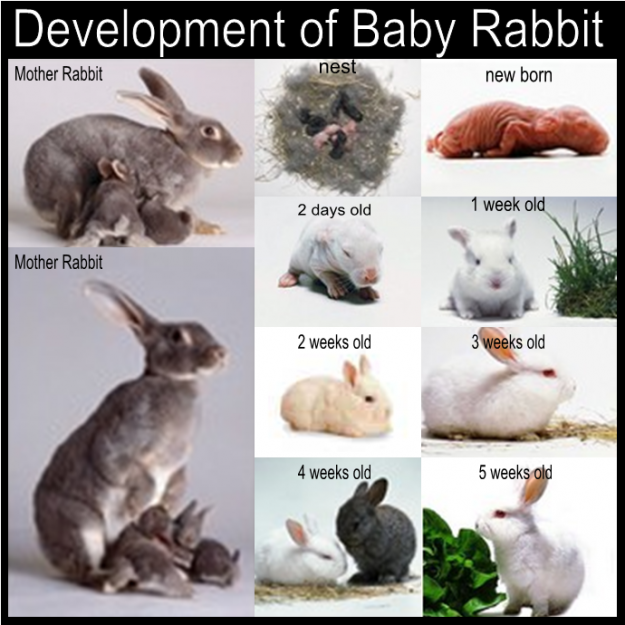 Source: bing.com
Source: bing.comWatching baby rabbits grow up is an incredible experience. From their tiny, helpless newborn stage to their energetic, playful adolescence and finally, their calm and content adulthood – every stage of their development is unique and fascinating. In this article, we will guide you through the various stages of baby rabbits’ development and give you tips on how to care for them at each stage.
Table of Contents
Stage 1: Birth to 2 Weeks – The Newborn Stage
Baby rabbits are born blind, deaf and hairless. They rely entirely on their mother for warmth, food and cleanliness. In the first few days of their lives, they will spend most of their time sleeping and nursing. At this stage, the mother’s milk provides all the nutrients they need for growth and development.
It is essential to keep the newborn rabbits warm, as they cannot regulate their body temperature independently. You can do this by providing a nest box filled with soft bedding and placing it in a warm, dry, and quiet location. Ideally, the temperature should be between 75-85°F (23-29°C).
Stage 2: 2-3 Weeks – The Furry Stage
Around two weeks of age, baby rabbits begin to grow their fur, and their eyes and ears start to open. At this stage, they will start moving around more, exploring their surroundings and nibbling on solid foods such as hay and pellets.
It is essential to continue providing a warm and safe environment and ensure the rabbits have access to plenty of fresh water and food. You can introduce them to fresh vegetables gradually, starting with small amounts and increasing the quantity as they grow.
Stage 3: 3-6 Weeks – The Playful Stage
Between three to six weeks of age, baby rabbits become more active and playful. They love to play and explore their environment, so it’s essential to provide them with a larger space to move around in. At this stage, you can introduce them to new toys and objects to stimulate their curiosity and provide additional enrichment.
It’s also important to continue feeding them a balanced diet of hay, pellets, fresh vegetables, and water. You should monitor their weight and growth to ensure they are developing correctly.
Stage 4: 6-12 Weeks – Adolescence
As baby rabbits approach their adolescent stage, they start to become more independent and may show signs of aggression towards their littermates. At this point, you may need to separate them into individual cages to prevent fighting.
It’s essential to continue providing a healthy diet and a stimulating environment to prevent boredom and destructive behavior. You can also start litter training the rabbits at this stage.
Stage 5: 12 Weeks and Beyond – Adulthood
Around 12 weeks of age, baby rabbits reach adulthood. They become calmer, less active, and more content with their surroundings. However, it is still important to provide a balanced diet, fresh water, and a stimulating environment to keep them happy and healthy.
At this stage, you can also consider neutering or spaying your rabbits to prevent unwanted litters and reduce aggressive behavior. It’s also important to schedule regular check-ups with a veterinarian to ensure your rabbits stay healthy and happy throughout their lives.
Frequently Asked Questions
Q: How often should I feed baby rabbits?
A: Baby rabbits should nurse from their mother every 2-3 hours for the first few days of their lives. As they grow older, you can introduce solid foods such as hay and pellets gradually.
Q: How do I keep baby rabbits warm?
A: You can keep baby rabbits warm by providing a nest box filled with soft bedding and placing it in a warm, dry, and quiet location. Ideally, the temperature should be between 75-85°F (23-29°C).
Q: When should I separate baby rabbits from their mother?
A: Baby rabbits should be weaned from their mother at around six weeks of age. At this point, you can separate them into individual cages to prevent fighting.
Q: When should I spay or neuter my rabbits?
A: It is recommended to spay or neuter rabbits at around four to six months of age, or as soon as they reach sexual maturity. This will prevent unwanted litters and reduce aggressive behavior.
Q: How do I litter train my rabbits?
A: To litter train your rabbits, provide them with a litter box filled with hay or paper-based litter. Place the litter box in an area where the rabbits spend most of their time, such as their enclosure or playpen. Reward them with treats when they use the litter box correctly.
In conclusion, every stage of baby rabbits’ development is unique and fascinating. By providing a warm, safe, and stimulating environment, a balanced diet, and regular veterinary check-ups, you can ensure that your rabbits grow up healthy, happy, and content.
